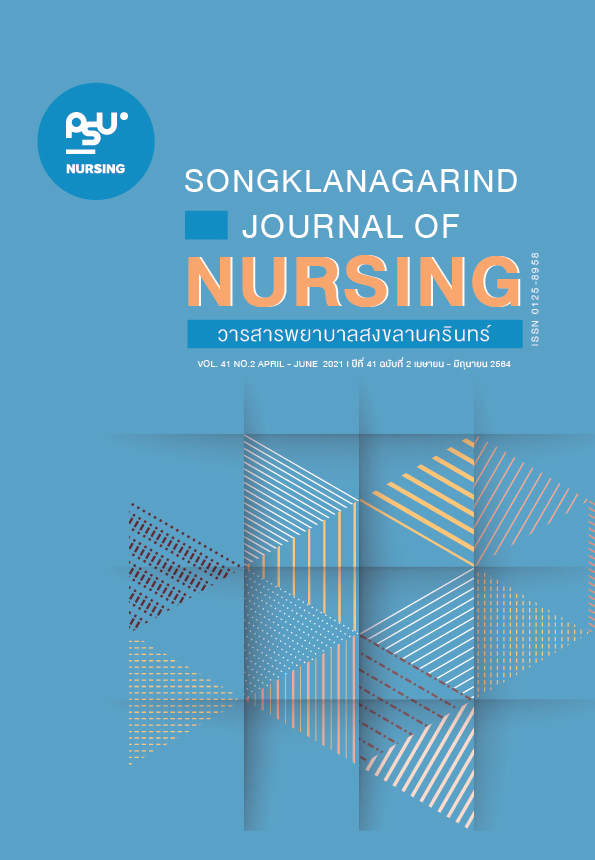The Influence of Attitude Knowledge Self-Efficacy and Outcomes Expectation to Integration of Eastern Wisdom in Nursing Practice of Nursing Students Faculty of Nursing, Prince of Songkla University
Main Article Content
Abstract
Objective: This research aimed to study the predictive ability of attitude, knowledge, self-efficacy, and expected outcomes of the integration of Eastern wisdom in nursing practices of nursing students at Faculty of Nursing, Prince of Songkhla University. Methods: Purposive sampling was used to select 109 fourth-year nursing students. Data were collected questionnaires which were 1) a demographic questionnaire, 2) a questionnaire on attitude towards Eastern Wisdom, 3) a questionnaire on knowledge about Eastern wisdom, 4) a questionnaire on self-efficacy, 5) a questionnaire on expected outcomes and 6) a questionnaire on the integration of Eastern wisdom in nursing practices. The content validity of the questionnaires was examined by 3 experts and yielded values of .95, .80, 1.00, 1.00 and .95 respectively. The reliability test of questionnaire 2) yielded the Kuder-Richardson 20 value of .70, while questionnaires 3-6 obtained the Cronbach’s alpha coefficient values of .80, .83, .92 and .89 consecutively. The data were analyzed by using descriptive statistics, Pearson’s product-moment correlation coefficient, and multiple regression analysis. Results: The results showed that the variance of Eastern-wisdom-integrated nursing practices in 21 percent of nursing students can be explained by knowledge, attitude and self-efficacy with regression coefficients equal to -.30, .35 and .17 respectively. Thus, instructors should cultivate a good attitude towards Easternwisdom-integrated nursing practices in nursing students to promote holistic health care.
Article Details
References
Chantraket R, Sonksakda M, Metranon P. Situations of using Thai traditional medicine service in 2009, 2011, 2013. HSRI Journal. 2016; 10(2): 103-16. Thai.
Theppan K, Suwannapong N, Howteerakul N, et al. Decision making on the utilization of Thai traditional medicine in general hospital, Ratchaburi Province. Journal of Phrapokklao Nursing College. 2017; 28(2): 80-92. Thai.
Longmeewong P, Boonpoapichart S, Duangduean K, et al. Current situation and opinion surver about integrated complementary and alternative medicine with conventional medicine among decision maker of medical school in Thailand. Community Health Development Quarterly Khon Kaen University. 2017; 5(1): 341-59. Thai.
Hatthakit U. Holistic Nursing with the integration of Eastern Wisdom. Songkhla: MAX MEDIA Y2K PRESS; 2014.
Buddharat U, Sen-Ngam K, Khamchan P. Using eastern wisdoms in nursing care for patients of registered nurse in the south of Thailand. Songklanagarind J Nurs. 2015; 35(2): 1-20. Thai.
Hatthakit U, Chukumnerd P. Factors related to integration of eastern wisdom into nursing practice. Songklanagarind J Nurs. 2015; 35(Suppl): 1-14. Thai.
Ben-Arye E, Schiff E, Zollman C, et al. Integrating complementary medicine in supportive cancer care models
across four continents. Med Oncol. 2013; 30(2): 511. doi: 10.1007/s12032-013-0511-1.
Chuntharapat S, Chukumnerd P, Panchana S, et al. Effects of yoga-based self-efficacy enhancement program on health behaviors and body weight increasing in overweight pregnant women. ASJ-PSU. 2018; 29(1): 148-63. Thai.
Bandura A. Self-efficacy: Toward a unifying theory of behavioral change. Psychological Review. 1977; 84(2): 191-215. doi: https://doi.org/10.1037/003-295x.84.2.19.
Bandura A. Social foundations of thought and action. Englewood Cliffs, NJ; 1986.
Fongkerd S, Pookitsana S, Tangjirawattana M, et al. Factors influencing health promoting behaviors of Thai adolescents. Nursing Journal of the Ministry of Public Health. 2017; 196-209. Thai.
Sirikhetkon S. Knowledge, attitude, perception and behavior toward Thai traditional and alternative medicine services in Uthaithani province. Journal of Bamrasnaradura Infectious Diseases Institute. 2019; 13(2): 111-22. Thai.
Balouchi A, Mahmoudirad G, Hastings-Tolsma M, et al. Knowledge, attitude and use of complementary and alternative medicine among nurses: A systematic review. Complement The Clin Pract. 2018; 1(31): 146-57. doi: 10.1016/j.ctcp.2018.02.008.
Nonthing P, Charoenphon S, Kunwaradisai N, et al. Situation, problems and barriers of using herbal medicine in public hospitals. IJPS. 2013; 9(1): 29. Thai.
Ben-Arye E, Cassileth B, Heusser P, et al. Complementary and integrative oncology in the cross-cultural region of the middle east and South Asia. Evidence-Based Complementary and Alternative Medicine; 2012.
Chukaew S, Sirapo-ngam Y, Prapaipanich W. Knowledge, attitude, and practice perceived by nurses in helping and promoting caregivers’ health. Rama Nurs J. 2012; 18(2): 249-58. Thai.
Poorananon P, Krirkgulthorn T. Factors predicting nursing student’s competency in evidence-based nursing. J NURS SCI. 2011; 1(Suppl): 47-55. Thai.
Ray TD, Henry K. Self-efficacy and physical activity in children with congenital heart disease: Is there a
relationship?. J Spec Pediatr Nurs. 2011; 16(2): 105-12. doi: https://doi.org/10.1111/j1744-61555.2011.00282.x.
Sung SC, Huang HC, Lin MH. Relationship between the knowledge, attitude, and self-efficacy on sexual health care for nursing students. J Prof Nurs. 2015; 31(3): 254-61. doi: https://doi.org/10.1016/j.profnurs.2014.11.001.
Walker BF, Armson A, Hodgetts C, et al. Knowledge, attitude, influences and use of complementary and alternative medicine (CAM) among chiropractic and nursing students. Chiropr Man Therap. 2017; 25(1): 29. doi: 10.1186/s12998-017-0160-0.
Chansiri S, Phahuwatanakorn W, Yusamran C. Influences of breastfeeding attitude, subjective norm, and self-efficacy on intention to exclusive breastfeeding among teenage pregnant women. J NURS SCI. 2017; 35(4): 49-59. Thai.
Pothiban L, Pungchompoo W. Knowledge, belief, selfefficacy pertaining osteoporosis preventive behaviors and osteoporosis preventive behaviors among the middle adult population. Nursing Journal. 2013; (Suppl): 67-78. Thai.
Sookdee N, Jadesalug V. Influence of knowledge and attitude on the success of work performance through participation of budgeting process on Kanchanaburi Rajabhat University. Veridian E-Journal. 2014; 7(2): 1149-62. Thai.
Sibounheuang S, Supamanee T, Thungjaroenkul P. Knowledge, Attitude, and Practice in nursing process among nurses, Lao people’s democratic republic. Nursing Journal. 2016; (Suppl):140-50. Thai.
Prasanwon K, Patoomwan A, Pookboonmee R. Nurses’ knowledge, attitude, and nursing practices for pain
management for postoperative children. Rama Nurs J. 2018; 24(1): 37-50. Thai.


